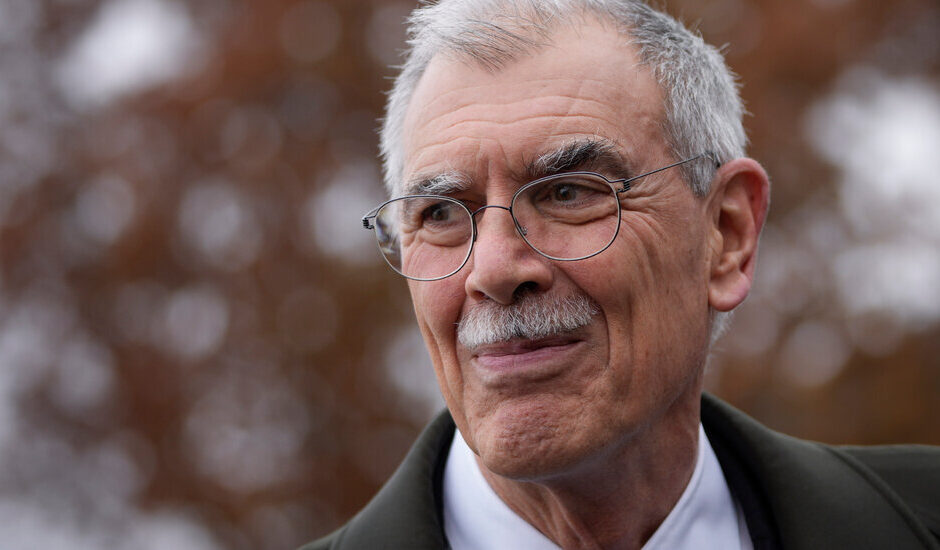More than 500 law firms on Friday threw their support behind some of their embattled peers, declaring that President Trump’s recent crackdown on the law firm industry poses “a grave threat to our system of constitutional governance and to the rule of law itself.”
The firms, 504 in all, signed a so-called friend of the court brief that was filed on behalf of Perkins Coie, the first firm to receive an executive order restricting its business.
Perkins Coie sued the Trump administration, and a judge has temporarily blocked the president’s order, which jeopardized its ability to represent government contractors and limited its access to federal buildings. While the judge weighs whether to permanently block the order, a wide-ranging effort has been underway to collect signatures for the brief.
The New York Times reported this week that none of the nation’s top 10 revenue-generating firms signed the brief before a soft deadline on Tuesday, and that remained the case on Friday. In fact, not a single top 20 firm by revenue, as ranked by American Lawyer, signed, including Kirkland & Ellis, Latham & Watkins or Gibson Dunn.
Yet in recent days, a few large firms did add their signatures, including Covington & Burling, No. 28 in American Lawyer’s rankings; and Arnold & Porter, No. 47. Two other big firms that received executive orders and are also challenging them in court, WilmerHale and Jenner & Block, also signed. All told, nearly 10 firms in the top 100 signed the brief.
Other friend of the court briefs were also filed in support of Perkins Coie, including one signed by both the A.C.L.U. and the Cato Institute, the Washington-based libertarian think tank.
In a statement, Perkins Coie said it was “grateful for the support” in its “challenge to the unconstitutional executive order and the threat it poses to the rule of law.”
The brief filed by the law firms similarly argued that Mr. Trump’s orders ran afoul of the Constitution, violating the First, Fifth and Sixth Amendments.
“The judiciary should act with resolve — now — to ensure that this abuse of executive power ceases,” said the brief, which was drafted by Donald B. Verrilli Jr., a solicitor general during President Barack Obama’s administration. “Whatever short-term advantage an administration may gain from exercising power in this way, the rule of law cannot long endure in the climate of fear that such actions create.”
Mr. Verrilli is now a partner at Munger, Tolles & Olson, a firm that is well-known but not among the nation’s top revenue generators.
Law firm size and ranking were not the only factors in signing. Geography also appeared to play a determining role: Signatures came from top firms in Washington and Chicago, but not New York.
Sullivan & Cromwell did not sign, nor did Skadden, Arps, Slate, Meagher & Flom, which recently struck a deal with Mr. Trump to avoid an executive order. Paul Weiss, which was the target of an executive order before it reached a deal of its own, did not sign either.
The big New York firms that withheld their signatures were not necessarily opposed, according to people with knowledge of the matter. They quietly support the principle of it, but are concerned that signing the document would draw Mr. Trump’s ire and cost them clients, or that signing would not meaningfully help Perkins Coie.
Some firms that did not sign are nonetheless supporting firms that Mr. Trump targeted. Williams & Connolly is representing Perkins Coie, while Cooley is representing Jenner & Block, another firm that chose to fight Mr. Trump’s order in court. WilmerHale is represented by a prominent conservative litigator, Paul Clement.
In all three cases, judges have temporarily blocked the key elements of the president’s orders.
In each of those cases, firms that received an executive order had ties to the investigation into Russia’s support for Mr. Trump’s 2016 presidential campaign.
Perkins Coie was involved in a dossier compiled during the 2016 campaign about Mr. Trump’s potential ties to Russia. WilmerHale once employed Robert Mueller III, the former F.B.I. director who served as the special counsel leading that investigation. And Jenner & Block was home to a top prosecutor who worked with Mr. Mueller.
Other firms chose to cave to Mr. Trump’s demands before being hit with an executive order. Over the last week, Willkie Farr & Gallagher and Milbank both cut deals promising to dedicate $100 million of pro bono work to causes that Mr. Trump supports.
While the firms avoided protracted battles with Mr. Trump, the deals have drawn widespread condemnation in the legal community. And they appeared to embolden Mr. Trump, who has hinted that additional law firms are in his sights.
Mr. Verrilli’s brief, which was co-written by Nathan P. Eimer, a Chicago litigator, warned about the perils of the executive orders and called on judges to intervene.
“Unless the judiciary acts decisively now, what was once beyond the pale will in short order become a stark reality,” the brief said. “Corporations and individuals alike will risk losing their right to be represented by the law firms of their choice and a profound chill will be cast over the First Amendment right to petition the courts for redress.”
#Law #Firms #Perkins #Coie #Fight #Trump


